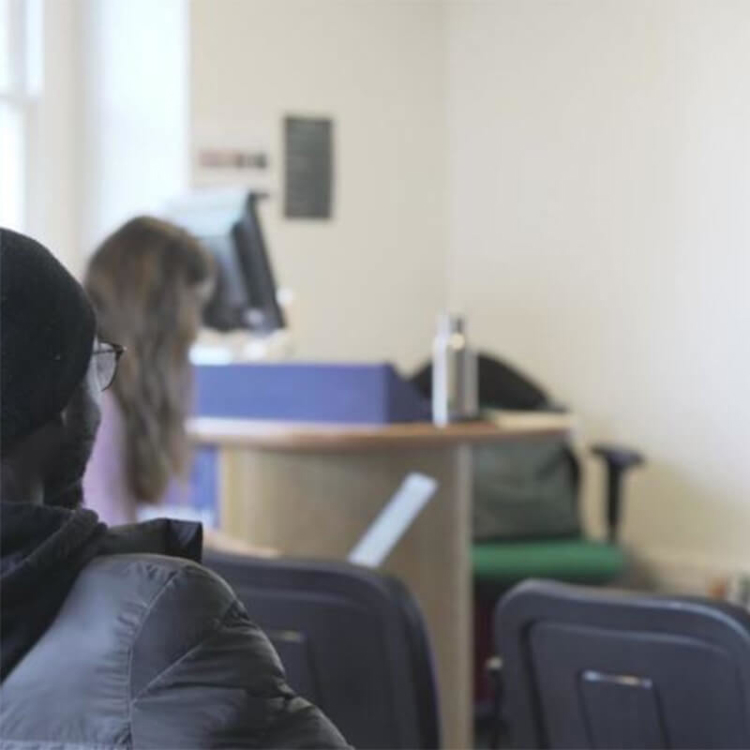Duration:
1 year (full-time)
2 years (part-time)
Please add an additional year if undertaking the Professional Experience Year: integrated 2-year masters
Number of credits:
MSc: 180
Start date(s):
September 2026
January 2027
Learn to apply psychology to real-world forensic and criminal justice challenges, gaining the skills and practical experience that set you apart. Designed for students from a range of backgrounds, not only psychology, this MSc equips you with practical expertise relevant to roles in mental health, probation, policing and support services, while building your understanding of the UK justice system.
You’ll develop a strong foundation in addressing complex issues, including:
- Criminal behaviour and offending
- Mental health within the criminal justice system
- Youth offending, domestic abuse, substance misuse, and sexual and violent offences
Through practical, student-focused learning, you’ll build confidence in critical thinking, ethical practice and professional communication, while engaging with systemic inequalities, trauma-informed approaches and cultural competence. As your expertise grows, you’ll gain hands-on experience in risk assessment, case formulation, intervention planning and evidence-based practice, alongside advanced research, data analysis and evaluation skills. A capstone project linking psychology with policy and reform further prepares you for careers in practice, research or system-level change.
By the end of the programme, you’ll have the applied knowledge, professional experience and practical insight to pursue a meaningful career in forensic psychology, criminal justice or related fields.
Did you know?
You’ll shape your learning around your goals. With varied assessments, such as portfolios, risk assessments, recorded presentations, case formulations and court reports, you’ll build real-world skills, not just academic knowledge.
Modules and projects are designed to support career changers, international students and anyone seeking a flexible, practical route into forensic and justice-related fields.
Modules
This module explores the complex relationship between mental health and the criminal justice system. You’ll critically examine how psychological theories, research, and applied practice shape fair, ethical, and effective responses to offending behaviour. You’ll learn about key legal frameworks, including the Mental Health Act and the Mental Capacity Act, and explore how these apply in real-world contexts such as court proceedings, parole decisions, and multi-agency working.
This module provides a critical foundation as you enter the field of forensic psychology, focusing on the academic, professional, and reflective skills essential for success in both postgraduate study and applied forensic contexts. You’ll be introduced to the expectations of academic integrity, the skills needed to critically engage with and evaluate research evidence, and how to structure your writing and communication in ways that are relevant to professional settings—such as psychological reporting and other forensic applications. Core skills, including sourcing and appraising empirical literature, applying ethical principles in both research and practice, and developing coherent academic arguments, will be developed through the lens of forensic psychological practice.
In this module, you will build a comprehensive foundation in both quantitative and qualitative research methods tailored to criminal and forensic psychology. You will develop advanced skills in research design, data collection, analysis, and interpretation, working with a variety of methodologies, including hypothesis testing, experimental design, survey research, interviews, and focus groups. Through weekly lectures and seminars, you will strengthen your critical analytical abilities, learning to use statistical software (e.g., SPSS) for quantitative analysis and applying qualitative approaches, like thematic analysis. Throughout the module, you will reflect on ethical considerations, reproducibility, and the evaluation of validity and reliability across both quantitative and qualitative methods. By engaging in hands-on exercises and applied projects, you will gain the practical experience needed to design, conduct, and analyse research, preparing you to critically apply a wide range of methods to criminal and forensic psychology topics and real-world contexts.
This module will provide with an advanced, integrated understanding of theories of criminal behaviour, forensic risk assessment, case formulation and psychological interventions within forensic settings. Lectures will provide you with the required teaching to understand general and specific offending behaviours, typologies within different offending populations and the aetiology of offending behaviours.
Assessment for this module consists of two equally weighted components. The first is a risk assessment report, where you will apply a risk assessment tool to a chosen case study, based on your workshop practice. The second is a case formulation, completed on one of several case studies, of which you can choose.
This module will provide you with an advanced, integrated understanding of theories of criminal behaviour, forensic risk assessment, and psychological interventions within forensic settings. Lectures will provide you with the required teaching to understand general and specific offending behaviours, typologies within different offending populations and the aetiology of offending behaviours.
Assessment for this module is divided equally between a reflective report and a recorded presentation. For the report, you will choose three areas of offending behaviour that have had the greatest impact on your learning. The presentation will be based on a topic related to understanding criminal behaviour, selected from a list provided.
This module provides you with the opportunity to complete a capstone project in a forensic or criminal psychology context. You’ll have the flexibility to choose a project type that aligns with your interests and career goals—whether that’s an empirical research paper, a meta-analysis, a systematic literature review, an impact case study, or a service evaluation. Whichever path you choose, the module places strong emphasis on scientific rigour, ethical integrity, and methodological competence in forensic psychological research.
Professional Experience Year
This course also offers the option of a Professional Experience Year. This programme combines dynamic career modules with flexible placement opportunities. After completing your first year of study, you'll then spend the next academic year completing your Professional Experience training as part of your degree. This will give you real career experience. This unique opportunity offers you distinct paths to build your expertise.
Careers
The MSc Psychology of Forensic and Criminal Behaviour equips you with the knowledge, practical skills, and confidence to make a real impact across criminal justice, forensic, mental health, and third-sector settings.
Graduates pursue a variety of roles, including probation and rehabilitation officers, youth offending service workers, facilitators of prison-based programmes, and practitioners in forensic mental health services or community teams. Others work in victim support, advocacy, or research, policy, and analytical roles within charities, local authorities, or government departments.
The programme also provides a strong foundation for further study, whether in specialist postgraduate qualifications in investigative interviewing, mental health, or criminal investigation, or in PhD research exploring areas such as desistance, risk assessment, and trauma-informed care.
Throughout the course, you will develop transferable skills highly valued by employers, including analytical thinking, professional report writing, ethical decision-making, interagency collaboration, and risk communication. These skills ensure you are ready to contribute effectively in a wide range of professional environments, from prison and probation services to police and security, NHS mental health teams, charities, government departments, and academia.

Learning and Assessment
How you’ll learn:
This programme uses active, student-centred approaches to help you develop both academic and professional skills. You will engage in a variety of learning activities, including:
- Interactive lectures and seminars
- Case-based learning and role plays
- Group discussions and collaborative problem-solving
- Reflective practice exercises
- Simulated professional scenarios
You will also make extensive use of digital tools such as Moodle, MS Teams, SPSS, NVivo, and WriteNow to support learning, research, and data analysis. These platforms help you practise key skills in a flexible, accessible way while developing your digital literacy.
Modules encourage you to apply theory to real-world forensic and criminal justice contexts. You will critically examine processes within the UK criminal justice and mental health systems, work on culturally sensitive and trauma-informed case studies, and explore international research and practices. Professional skills are developed through authentic tasks such as forensic risk reports, reflective portfolios, court-style exercises, and independent projects aligned with your career interests.
Support is embedded throughout your learning journey. You will receive guidance from tutors, supervisors, and academic support staff, as well as personalised feedback, including AI-supported tools, to help you reflect, improve, and build confidence in your knowledge and professional capabilities.

How you’ll be assessed:
Assessment is designed to support your learning and prepare you for professional practice. Throughout the programme, you will take part in formative activities that help you develop academic and applied skills, build confidence, and receive regular feedback. These activities include:
- Discussions and debates
- Reflective exercises and peer review
- Supervised tasks and practical exercises
Summative assessments formally evaluate your learning across each module and the Capstone Project. You will experience a variety of assessment types, including:
- Written reports, literature reviews, and research projects
- Applied casework and forensic assessments
- Oral and visual presentations
- Reflective portfolios
Where possible, you have choice in topics or formats, supporting different learning styles and interests. The Capstone Project allows you to undertake a substantial independent piece of work, such as empirical research, a service evaluation, or a case study, demonstrating your ability to apply forensic psychology in real-world contexts.
All assessments are supported with clear guidance, marking criteria, structured feedback, and opportunities to act on advice. The programme also encourages responsible use of technology, including AI tools, to enhance learning and professional practice.
Open days
Get a real taste of our campus, community and what it’s like to study at Roehampton
Applying
UK postgraduate students apply through our direct application system.
Specific entry requirements
An undergraduate degree in an area related to psychology (e.g., criminology or from a similar subject area) with a minimum grade of second-class honours (2:2)
General entry requirements
International postgraduate students apply through our direct application system.
Specific entry requirements
An undergraduate degree in an area related to psychology (e.g., criminology or from a similar subject area) with a minimum grade of second-class honours (2:2)
General entry requirements
Fees and funding
UK students
Tuition fees
| Entry date | MSc (full-time) | MSc (part-time) |
|---|---|---|
| September 2026 | £11,250 | £5,625 |
| January 2027 | £11,250 | £5,625 |
Prices shown are for the first year of your degree.
Additional fees to consider
Students may be required to apply for DBS through the university, if there are potential forensic work experience being offered.
Funding your studies
We also provide other ways to support the cost of living, including on-campus car parking, hardship support and some of the most affordable student accommodation and catering in London.
International students
Tuition fees
| Entry date | MSc (full-time) | MSc (part-time) |
|---|---|---|
| September 2026 | £18,980 | £9,490 |
| January 2027 | £18,980 | £9,490 |
Prices shown are for the first year of your degree.
Additional fees to consider
Students may be required to apply for DBS through the university, if there are potential forensic work experience being offered.
Funding your studies
We also provide other ways to support the cost of living, including on-campus car parking, hardship support and some of the most affordable student accommodation and catering in London.






